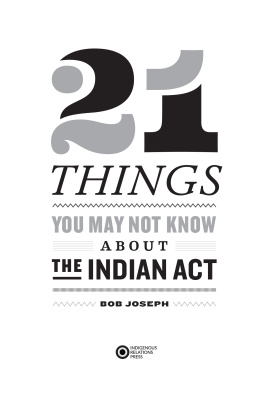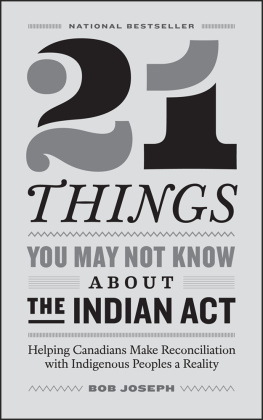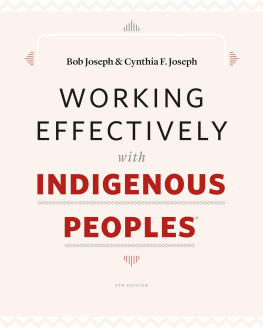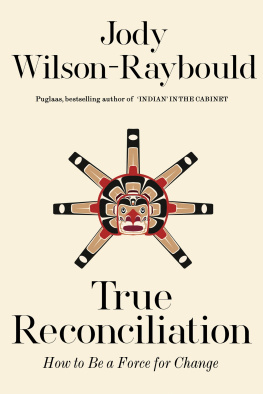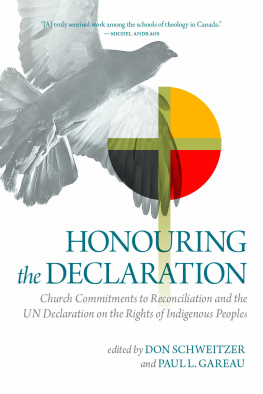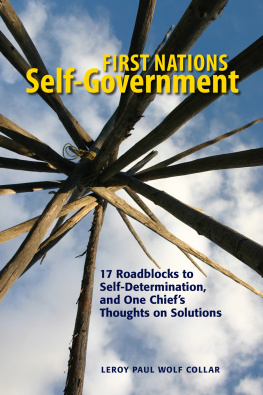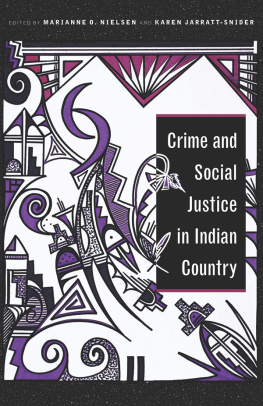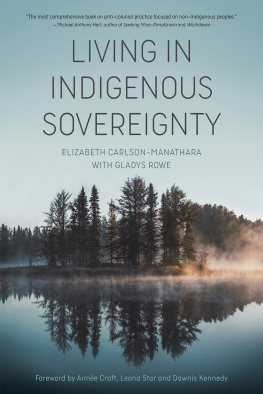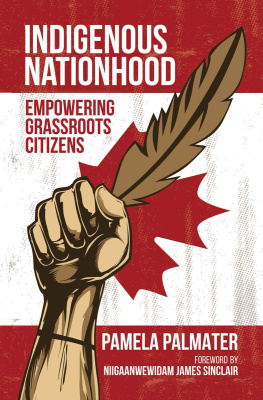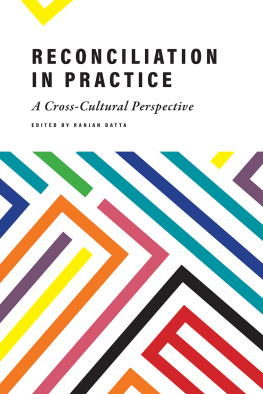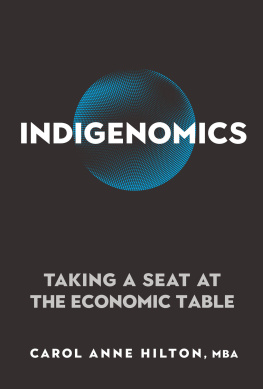PRAISE FOR
21 Things You May Not Know
About the Indian Act
I have a deep hope for Canada that there can be reconciliation. I want every Canadian to imagine a Canada in which every person will live with dignity, value, and purpose. But to do that, there must be reflection on our shared history and the harmful periods and events that continue to haunt us as a nation. Understanding the Indian Act is fundamental to understanding why those harmful periods and events took place. Bob Josephs book is an invaluable tool for Canadians who want to understand the past in order to contribute to reconciliation in our country.
Chief Dr. Robert Joseph , OBC , Ambassador, Reconciliation Canada
From declaring cultural ceremonies illegal to prohibiting pool hall owners from granting Indigenous Peoples entrance, from forbidding the speaking of Indigenous languages to the devastating policy that created residential schools, Bob Joseph reveals the hold this paternalistic act, with its roots in the 1800s, still has on the lives of Indigenous Peoples in Canada in the twenty-first century. This straightforward book is an invaluable resource. There is much for non-Indigenous people to learn and to do. But equally important, there is much to unlearn and to undo. The time is right for this book. Thank you, Bob Joseph. Gilakasla.
Shelagh Rogers , OC , Truth and Reconciliation Commission of Canada Honorary Witness
Increasing Canadians knowledge about the terrible foundation this country has been built on is a critical part of reconciliation. Bob Joseph has highlighted some of the unbelievable provisions of the Indian Act and how they have impacted First Nations in Canada, and gives a brief overview of what we may replace it with going forward. His book provides helpful context to the dialogue that needs to take place in Canada.
Kim Baird , OC , OBC , Owner, Kim Baird Strategic Consulting; Member of the Tsawwassen First Nation and Negotiator of the Tsawwassen First Nation Treaty
Bob Joseph, one of the pre-eminent instructors in Canada on how to develop positive relations with Indigenous Peoples, has written a must-read book for business leaders. His straightforward writing style paints a picture so that all Canadians can appreciate the draconian and oppressive nature of the countrys most racist legislation. The book identifies restrictions that range from laughableprohibiting First Nations Peoples from entering pool hallsto sinisterforbidding First Nations Peoples from practising their traditional beliefs and speaking their language. If you want to work with First Nations communities, read this book.
Clint Davis , Partner and Managing Director, ACASTA Capital Indigenous
Bob Joseph provides an incredible glimpse into the lengths the Canadian government took to limit Indigenous Peoples from achieving health, wealth, and cultural connections through the Indian Act. That much of this is still legal today is baffling, as he provides examples of how assimilation at all costs is still the end goal of the Indian Act. Canada still has much work to do to achieve reconciliation with Indigenous Peoples and, as Bob says, to dismantle the Indian Act once and for all.
Ginger Gosnell-Myers , Manager, Aboriginal Relations, City of Vancouver
Bob Josephs ability to navigate the complex history of the Indian Act is a wonder to behold. He provides depth and knowledge for Indigenous and non-Indigenous scholars alike. His articulate, insightful and comprehensive analysis on the history of the Indian Act provides a sound understanding of the present narrative of Indigenous Peoples in Canada. This book provides an excellent analysis of the ongoing relationship and predicament between provincial and federal governments and Indigenous Peoples in the twenty-first century.
J.P. Gladu , President and CEO , Canadian Council for Aboriginal Business
though they killed us
we live
they put us down
yet we stand
they deny
but there is truth
guujaaw
Acknowledgements
In working on this book I learned that as the author, I had the easiest job. Transforming a manuscript on Google Docs into a book and getting it into bookstores was beyond my ability. It was my great good fortune to discover the team at Page Two Strategies Inc. The publishing process is both fascinating and slightly intimidating, but the professionals at Page Two guided me through the stages and kept the intimidating aspect at a low murmur. Trena White, principal, instantly grasped why this book had to be available to all Canadians. Her excitement was uplifting and affirming. Amanda Lewis, project and development manager, poured her expertise into keeping the book development on course and on time. Working with Peter Cocking on cover and interior design was enthralling and an honour. Zoe Grams, marketing, was an endless source of energy and innovative marketing ideas and strategies. I would also like to thank Julie Domvile for her encouragement that this book was a necessary component of reconciliation, and for all her work on the research required to flesh out the punitive policies and prohibitions of the Indian Act.
To my many family and friends who have shared their knowledge along the way, thank you.
This book would not have happened if my way better half, Cindy Joseph, had not supported me in seeing the nugget of an idea transform into a book.
Deep gratitude to every Canadian who reads this book and takes to heart a commitment of reconciliation.
Introduction
As a blogger and trainer on Indigenous topics, in 2015 I decided to write an article about the IndianAct. My goal was to simply provide some take-aways about the Act for our learners and our blog Working Effectively with Indigenous Peoples. Of the Acts many aggressive, destructive, and frequently contradictory statutes and policies, I selected 21 that were not common knowledge and called the article 21 Things You Might Not Have Known About the Indian Act. Response to the article was immense, intense, and enduring. The first month alone we had over 55,000 visitors to our website just from Facebook.
This response showed there was a real lack of information about First Nations (Indians) and nonFirst Nations but, more importantly, a real interest in learning about the Indian Act and its impacts. It made me realize the significance of the information and how knowing about the Indian Act could help people understand how it shaped the socio-economic and political reality of many generations of First Nations, and how it is the basis for many of todays stereotypes about First Nations. In reality, there was a foregone conclusion that Indians would simply die out, cease to exist, thereby absolving the government of any financial responsibility and giving clear access to the lands reserved for Indians.
I think it is critical that non-Indigenous Canadians be aware of how deeply the Indian Act penetrated, controlled, and continues to control, most aspects of the lives of First Nations. It is an instrument of oppression. If true reconciliation between Indigenous Peoples, the federal government, and non-Indigenous Canadians is going to be achieved, an understanding of how the Indian Actdespite its many amendments and modificationscontinues to direct the lives of First Nations and constrains the opportunities for First Nations and Canadians alike is essential.
In my professional life as an Indigenous relations trainer I am aware of the gap in knowledge regarding the history of Indigenous Peoples that spans from Confederation in 1867 to the 1960s. In my professional life I am also heartened by the increasing number of Canadians who register for my training because they want to learn and understand.

